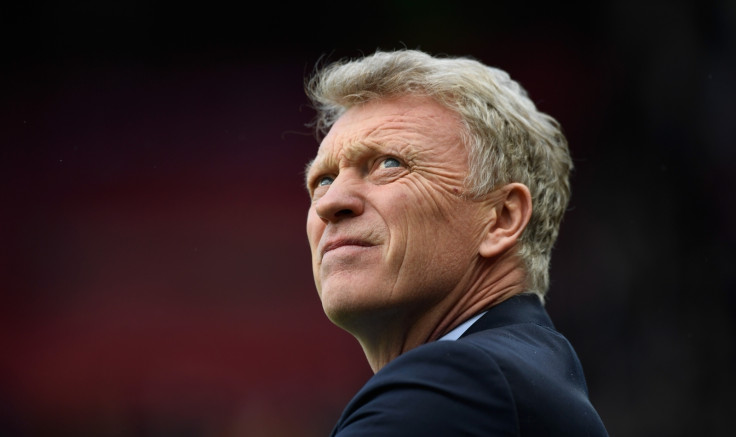Haunted David Moyes is damaged goods and West Ham should be fearing the worst
KEY POINTS
- Failed spells at Manchester United, Real Sociedad and Sunderland means the Scot's reputation has plummeted.
- Slaven Bilic sacked after The Hammers drop into the relegation zone
Just four short years ago David Moyes was the handpicked successor to the most successful British manager of all time at the biggest football club in the world. Now he is the punchline to the latest gag involving West Ham United. And the joke is very much on him.
Having backed Slaven Bilic as West Ham manager for longer than impatient fans thought appropriate, the club's owners are giving a classic impersonation of panicking and clutching at the first straw that came along. It is saying something that Moyes' appointment is probably considered a worse decision than Crystal Palace hiring Roy Hodgson or whichever club next chooses to employ Sam Allardyce.
Moyes' move is a classic case of the managerial-merry-go-round belching out its latest weathered failure. He's available. He's a name that always turns up in the bookies' runners-and-riders lists. He probably only got the gig ahead of Allardyce or Alan Pardew (also currently unattached) due to having not yet ticked east London off his hit-list.
Not much of a selling point to an already restless fanbase who have been promised that the departure of Bilic would present an "exciting opportunity to appoint a quality manager to the position to inject fresh ideas". They're still waiting.
Hammers fans are already disillusioned with their club over the move from their beloved Upton Park to the [London] Olympic Stadium. No matter that the move makes enormous financial sense to the club. No matter that the new stadium is the envy of many. West Ham supporters feel at-best uneasy, at worst betrayed by the club being uprooted from its East End roots to a shiny new home lacking in individuality.
Bilic's reign was spread over this huge change and as a result he was possibly given extra time to oversee a smooth transition.
The Croatian, who arrived at Upton Park with little experience managing at this level, took West Ham to seventh place in the Premier League in his first season. Some results could certainly be attributed to the highly charged atmosphere at the old ground pushing the team emotionally onwards. Another reason was the brilliance of the now sold Dimitri Payet.
Both of those factors disappeared at the newly-renamed London Stadium. A tepid atmosphere and the acrimonious departure of the Frenchman saw West Ham slide, but only as far as 11th in the table.
The club chose to stick with Bilic and most observers felt that having been given the vote of confidence ahead of the season he would at least see out the rest of his three-year contract until next summer. But a poor start to the season saw Bilic rapidly become a boss who was locked into a series of must-win games to secure his survival. Narrow defeats could be forgiven, but a home pummeling by Liverpool signalled the end.
That West Ham are just any old football club who will sack a manager mid-season is just another bitter pill for fans to swallow. Gone are the days when Hammers managers were long-standing institutions. West Ham had only eight permanent managers in their first 100 years (including 13 years under Ron Greenwood and 15 with John Lyall). Moyes is now their ninth permanent boss this century. Few expect the Scot will bring back the sort of flair football for which the club became famous: the home of Bobby Moore, Martin Peters, Geoff Hurst, Trevor Brooking.
Even fewer are predicting that Moyes will turn the team around. He made his reputation at Preston North End and Everton where he built solid teams with limited resources. But when he stepped onto the big stage he stumbled and his reputation has quickly collapsed.
Sir Alex Ferguson saw something in Moyes that made him suggest the Everton boss become his successor at Old Trafford. A cynic would suggest that Moyes' failings only helped highlight Ferguson's achievements.
Unsuccessful stints at Real Sociedad and Sunderland have done nothing to resurrect Moyes' reputation. Appointed manager at the Stadium of Light in July 2016, he was already predicting a relegation battle less than a month into the season. Negativity permeated the club and they duly finished rock bottom, winning only six games all season and with a goal difference of minus 40.
Fans will be rightly fearful over which players will be signed to supplement the inevitable crisis he will create. Marouane Fellaini had trouble winning over fans after he swapped Goodison Park for Manchester. Worse was to come at Sunderland when the north east club signed a host of Moyes' former charges, who made little discernible impact in the relegation battle: Victor Anichebe, Adnan Januzaj, Steven Pienaar, Paddy McNair, Darron Gibson, Joleon Lescott and Bryan Oviedo.
Moyes inherits a struggling team with a fanbase fearing the worst. The best that can be said for Moyes is that he has been in this situation before and maybe he has learned some of those lessons, but there is a stubborn streak in the manager that suggests otherwise.
As Sunderland plunged towards the drop Moyes declared: "A lot of good managers have been relegated. I'll use this to motivate myself." In other words, Sunderland's failings were not his fault. If West Ham are relegated who will be to blame? The manager or the people who appointed him?
Co-owner David Sullivan obliviously declared upon installing Moyes: "He proved with Everton that he has great qualities and we feel that West Ham United is a Club that will give David the platform to display those qualities again."
Four years may have been glossed over, but the cracks will be impossible to ignore if Moyes reels off a second relegation in a row. That will be no laughing matter.























